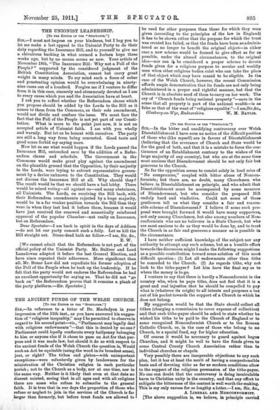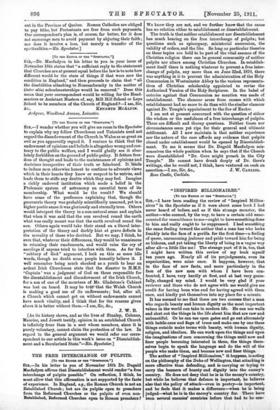[TO THE EDITOR Or THE " SPECTATOR:1 SIR,—In the bitter
and unedifying controversy over Welsh Disestablishment I have seen no notice of the difficultposition of those who (like myself) are in favour of Disestablishment (believing that the severance of Church and State would be for the good of both, and that it is a mistake to force the con- tinuance of an Establishment contrary to the wishes of the large majority of any country), but who are at the same time most anxious that Disendowment should be not only fair but generous to the Church.
So far the opposition seems to consist solely in loud cries of " No compromise," coupled with bitter abuse of Noncon- formists; but there are, no doubt, many Churchmen who believe in Disestablishment on principle, and who admit that Disestablishment must be accompanied by some measure of Disendowment, but who consider the proposed Bill unduly hard and vindictive. Could not some of these gentlemen tell us what they consider a fair and reason. able scheme of Disendowment ? I believe if some such pro- posal were brought forward it would have many supporters, not only among Churchmen, but also among numbers of Non- conformists who are no believers in a State Church, but who are most anxious to do as they would be done by, and to treat the Church in as fair and generous a manner as is possible in the circumstance.
I have neither sufficient knowledge of the subject nor any authority to attempt any such scheme, but as a humble effort towards the discussion might I make the following suggestions as a possible contribution toward some solution of this most difficult question : (1) Let all endowments other than tithe be conceded to the Church. (2) As regards tithe, why not look to the tithe-payer ? Let him have the final say as to where the money is to go.
I venture to say that there is hardly a Nonconformist in the country who, when he pays tithe, does not feel that it is a great and real injustice that he should be compelled to pay what is (whatever its origin) to all intents and purposes a tax out of bis pocket towards the support of a Church to which he does not belong.
My suggestion would be that the State should collect all tithes (charging a commission to cover expense of collection) and that each tithe-payer should be asked to state whether he wished his tithe to be paid to the Church of England or to some recognized Nonconformist Church or to the Roman Catholic Church, or, in the case of those who belong to no Church, to a special fund, say for higher education.
Of course it would be necessary to guard against bogus Churches, and it might be well to have the funds given to some Central County Church Association rather than to individual churches or chapels.
Very possibly there are insuperable objections to any such plan, but it has at least the merit of having a comprehensible basis and of devoting tithe as far as modern conditions allow to the support of the religious persuasion of the tithe-payer. No one can doubt that the controversy is doing incalculable harm to Christian unity in the country, and that any effort to mitigate the bitterness of the contest is well worth the making. This is my only excuse for so lengthy a letter.—I am, Sir, &c.,
A LIBERAL AND NONCONFORMIST. [The above suggestion is, we believe, in principle carried
out in the Province of Quebec. Roman Catholics are obliged to pay tithe, but Protestants are free from such payments. Our correspondent's plan is, of course, far better, for it does not encourage men to avoid payment by abjuring their faith; nor does it involve a loss, but merely a transfer of the spiritualities.—ED. Spectator.]



















































 Previous page
Previous page